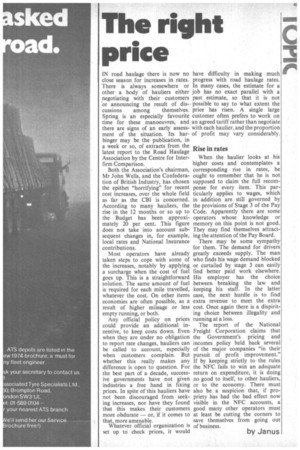The right price
Page 51

If you've noticed an error in this article please click here to report it so we can fix it.
IN road haulage there is now no close season for increases in rates. There is always somewhere or other a body of hauliers either negotiating with their customers or announcing the result of dis cussions among themselves. Spring is an especially favourite time for these manoeuvres, and there are signs of an early assessment of the situation. Its harbinger may be the publication, in a week or so, of extracts from the latest report to the Road Haulage Association by the Centre for Interfirm Comparison.
Both the Association's chairman, Mr John Wells, and the Confederation of British Industry, has chosen the epithet "horrifying" for recent cost increases, over the whole field as far as the CBI is concerned. According to many hauliers, the rise in the 12 months or so up to the Budget has been approximately 20 per cent. This figure does not take into account subsequent changes in, for example, local rates and National Insurance contributions.
Most operators have already taken steps to cope with some of the increases, notably by applying a surcharge when the cost of fuel goes up. This is a straightforward solution. The same amount of fuel is required for each mile travelled, whatever the cost. On other items economies are often possible, as a result of higher mileage or less empty running, or both.
Any official policy on prices could provide an additional incentive, to keep costs down. Even when they are under no obligation to report rate changes, hauliers can be called to account, especially when customers complain. But whether this really makes any difference is open to question. For the best part of a decade, successive governments have not given industries a free hand in fixing prices. In spite of this hauliers have not been discouraged from seeking increases, nor have they found that this makes their customers more obdurate — or, if it comes to that, more amenable. Whatever official organization is set up to check prices, it would have difficulty in making much progress with road haulage rates. In many cases, the estimate for a job has no exact parallel with a past estimate, so that it is not possible to say to what extent the price has risen. A single large customer often prefers to work on an agreed tariff rather than negotiate with each haulier, and the proportion of profit may vary considerably.
Rise in rates
When the haulier looks at his higher costs and contemplates a corresponding rise in rates, he ought to remember that he is not supposed to claim the full recompense for every item. This particularly applies to wages, which in addition are still governed by the provisions of Stage 3 of the Pay Code. Apparently there are some operators whose knowledge or memory on this point is not good. They may find themselves attracting the attention of the Pay Board.
There may be some sympathy for them. The demand for drivers greatly exceeds supply. The man who finds his wage demand blocked or curtailed by stage 3 can easily find better paid work elsewhere. His employer has the choice between breaking the law and keeping his staff. In the latter case, the next hurdle is to find extra revenue to meet the extra cost. Once again there is a dispiriting choice between illegality and running at a loss.
The report of the National Freight Corporation claims that the Government's pricing and incomes policy held back several of the major companies "in their pursuit of profit improvement." If by keeping strictly to the rules the NFC fails to win an adequate return on expenditure, it is doing no good to itself, to other hauliers, or to the economy. There must also be a suspicion that, if propriety has had the bad effect now visible in the NFC accounts, a good many other operators must at least be cutting the corners to save themselves from going out of business.
by Janus




































































































































